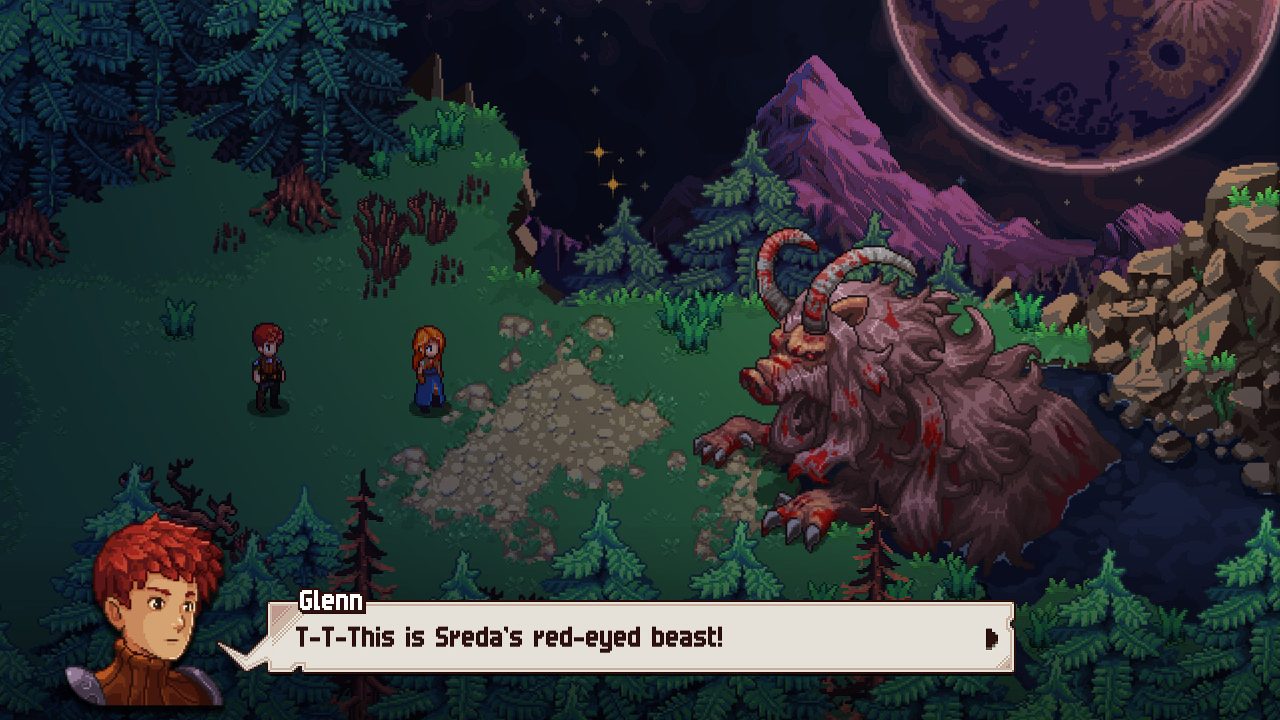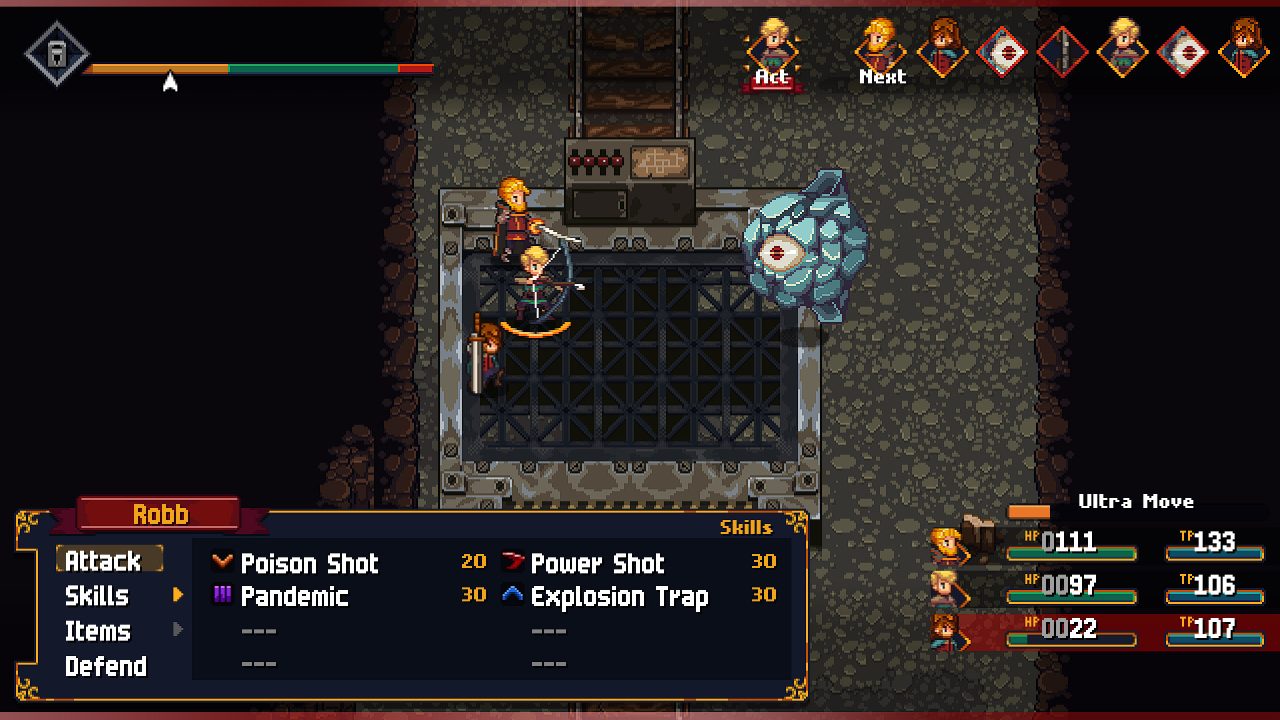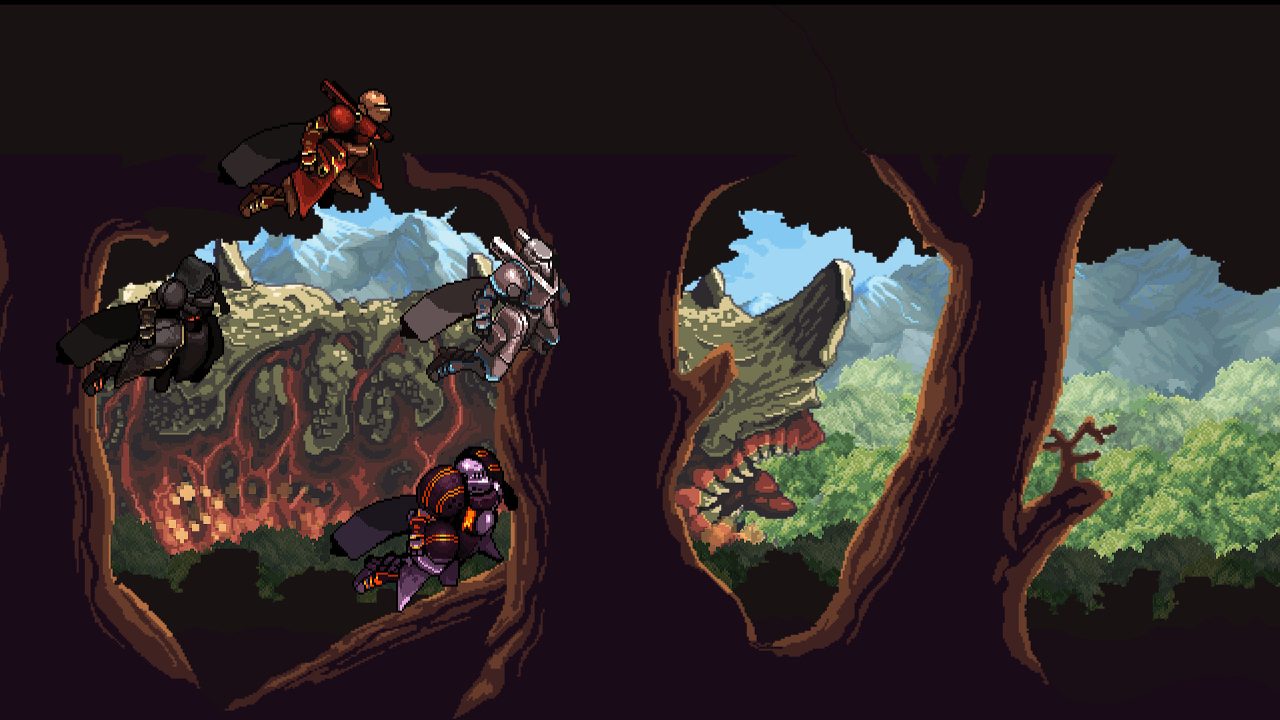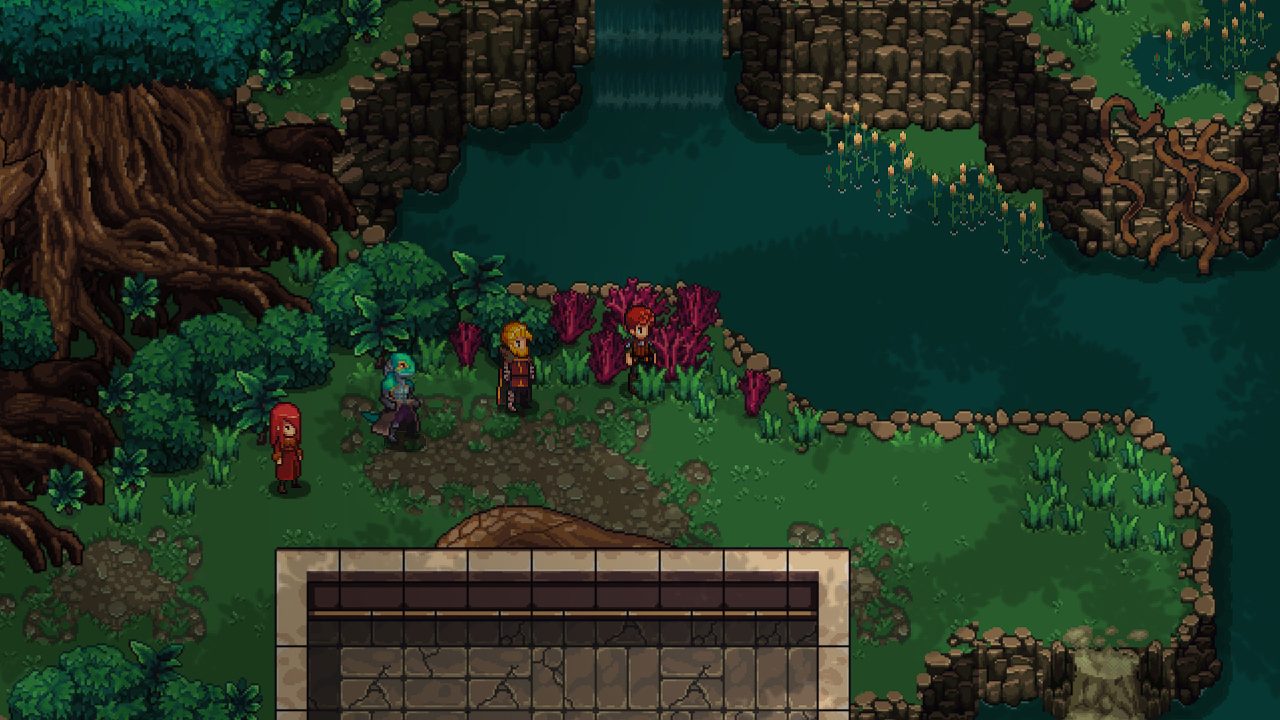A lot of us fondly remember our time playing games from the so-called “golden era” or RPGs. Whether it’s Final Fantasy VI and Chrono Trigger on the SNES or Xenogears and Final Fantasy IX on PS1, we’ve all talked about a classic RPG with nostalgia and reverence. And many of us have wished at some point that a new game could capture the magic that “old-school” RPGs bewitched us with when we were younger. Solo developer Matthias Linda had the same dream, and after many years and a successful Kickstarter campaign, he has created a love letter to his favorite RPGs that is also simply a fantastic game in its own right: Chained Echoes.
Taking place on the war-torn continent of Valandis, Chained Echoes tells the story of a diverse and ragtag band of heroes brought together by equal parts fate and coincidence. What starts as a noble quest to bring peace to the land turns into a sprawling crusade against evil tyrants, vain deities, and an ancient evil that threatens to destroy all life. You know, the usual. It’s easy to see elements of the classic RPGs that inspired this game throughout its well-paced main story, but it never feels like a carbon copy. On the contrary, there were times when my expectations were brilliantly subverted, and I found myself surprised by several of the plot twists. I will say, though, that the game’s final twist felt a little like it came out of nowhere, and it wasn’t particularly satisfying as a result. Also, some of the big bads aren’t dealt with by the time the credits roll, which makes me wonder if Linda intends to one day make a sequel.

The most glaring issue with the game’s story, however, is the writing. Sometimes it’s totally fine, but more often than not, the dialogue is awkward and stilted. It’s still absolutely understandable and enjoyable, but the mistakes can sometimes distract and take you out of the moment. To be fair, the developer is not a native English speaker, so the errors are perfectly understandable. And considering the large amount of text in the game, it’s still quite the achievement for one person, regardless of their language or proficiency.
The core cast of Chained Echoes are an interesting bunch. They come from several different walks of life, and while one of them eventually emerges as the group’s leader, they largely function as an ensemble. The game’s opening hours even have you jump from character to character by way of introduction, similar to Final Fantasy IX. Sassy thief Sienna is a standout for me, and enigmatic playwright Victor also became one of my favorites after an intriguing late-game reveal. There are even a few optional characters you can add to your party through side quests, but they sadly don’t get anywhere near the same level of development as the main party and are usually left out of story cutscenes.
Speaking of side content, there’s a plethora of diversions to discover in Chained Echoes. Some are full-blown quests that pop up occasionally as you progress the story, while others are surprise events you run into as you explore the game’s many sprawling areas. There’s a reward board you can fill out as you achieve various objectives, some of which include finding hidden chests or taking out the game’s powerful unique monsters — hello, Xenoblade! Eventually, you get access to your own island, and the game allows you to recruit clan members and build a base, à la Skies of Arcadia. You even get an airship and Xenogears-like mechs called Sky Armors, both of which you can customize and use to reach out-of-the-way areas, where you’ll often find goodies. I lost track of how many times the game made me smile with a system or feature it added, and all of it works so well, especially considering it’s made by one person.
On that note, it’s worth pointing out that even though Chained Echoes is inspired by and pays tribute to classic RPGs, it most definitely does not attempt to replicate some of their more frustrating limitations. For example, fast travel is freely available after the game’s introduction, you can save anywhere, characters grow and level regardless of whether they are in the active party, and you can retry battles should you get wiped out — to name but a few. There are also a handful of options that allow you to adjust the difficulty of combat, including the game’s unique battle mechanic: the Overdrive meter.

As you explore areas and run into monsters (there are no random battles, by the way), you of course have to fight. Combat is turn-based, and while the basics of trading blows with enemies using simple attacks or special skills will feel immediately familiar, Chained Echoes mixes things up with the Overdrive system. Every attack or skill used by your party or the enemy moves an arrow to the right on the Overdrive meter. You start in the yellow, which is neutral, but eventually, you hit the green part of the bar, which confers several beneficial effects — such as taking less damage and reducing the cost of skills. But if you keep moving too far to the right, you enter the red overheat zone, drastically increasing the damage you take. To move the arrow to the left and keep yourself in the sweet spot, you need to use a skill that matches a particular type, which cycles randomly every four turns. If you don’t have a matching skill available, you can also defend, swap out the current character with a reserve member, or use a powerful Ultra Move to lower the meter.
Battles thus become as much about using the right moves at the right time as they are about reducing your enemies’ HP to zero. Spamming the same moves will eventually penalize you, so you are encouraged to mix things up to maximize every turn. For the most part, I enjoyed this system. It adds an element of strategy to the otherwise standard turn-based combat, and there are even a few boss fights that further shake things up by changing the appearance of the Overdrive meter, which forces players to adapt on the fly. On the other hand, it can sometimes feel punishing and restrictive. Unless you just don’t care about the extra damage caused by overheating, you will have to use skills or Ultra Moves you may not really want to — sometimes skills that have no beneficial use at the moment other than matching the random skill type. That can feel pointless and extend the amount of time you spend in combat, which is a little on the slow side as a result.

As a brief aside, you can also fight in your Sky Armors once you gain access to them, and while the Overdrive meter is still present, it functions a little differently. Instead of using skill types to control the meter, you shift gears to change the direction the arrow moves. Shifting gears also changes how much damage you deal and receive as well as how much skills cost. This makes mech combat a balancing act where you have to gauge how long you can stay in the higher gears to maximize your damage before you need to shift down to keep from overheating. I think there are strengths and weaknesses with both versions of the Overdrive system, but frustrations aside, it still makes for a very enjoyable and unique combat experience.
Of course, half the fun in any RPG is leveling and customizing your characters. Chained Echoes provides some of the usual RPG features, like upgrading equipment, using skill points to improve your techniques, and even a rudimentary class system. But the game has an interesting take on leveling that I came to greatly appreciate. Instead of gaining experience from battles, you earn grimoire shards after beating bosses and achieving certain milestones. Every grimoire shard gives each of your characters a point that can be spent to learn new skills or boost attributes. As you use these points, you’ll also periodically receive stat increases, much like you would when leveling up in a traditional EXP system.
The great thing about this is that it keeps you on a level playing field with both bosses and regular enemies. Because access to grimoire shards is largely controlled by story progression, you can’t just grind to outlevel your opponents, so the challenge remains consistent throughout the game. It also incentivizes you to uncover, upgrade, and customize new equipment, which is often the key to surviving encounters with monsters in new areas. This, in turn, encourages you to fully explore each map and take advantage of the FFXII-esque deals merchants offer for selling loot, as you’ll generally find better gear that way than simply buying it from shops.

As for graphics, the 16-bit retro aesthetic of Chained Echoes shines brightly from the first cutscene to the end credits. Linda’s pixel art is simply gorgeous, particularly as you explore the varied environments teeming with charm. Tall grass sways in the wind and wild animals abound, making each area feel lush and alive. There are also some lovely pixel portraits for major characters that look heavily inspired by Final Fantasy Tactics, and that’s always a plus in my book.
As if all the above wasn’t exceptional enough, the music in Chained Echoes is utterly fantastic. Much like the game itself, you can hear the influence of and love for classic RPGs in every track. The battle tracks are especially wonderful, and in true JRPG fashion, there are epic rock and choir-laden orchestral themes to accompany some of the more dramatic conflicts, including a multi-part final boss suite. I had never heard of the composer, Eddie Marianukroh, before playing the game, but he made a splash in a big way with this soundtrack, so I hope to hear more from him soon!
I’ve played many impressive games over the years, but I don’t think I’ve ever been quite as impressed by a game as I have with Chained Echoes. The sheer quality and quantity of content is honestly kind of insane for a solo developer, and while there are some bugs here and there, it all runs pretty damn smoothly too! Whether you’re looking for a nostalgic adventure or just want to play a fresh, new indie RPG, Chained Echoes is a gem that should not be missed.



